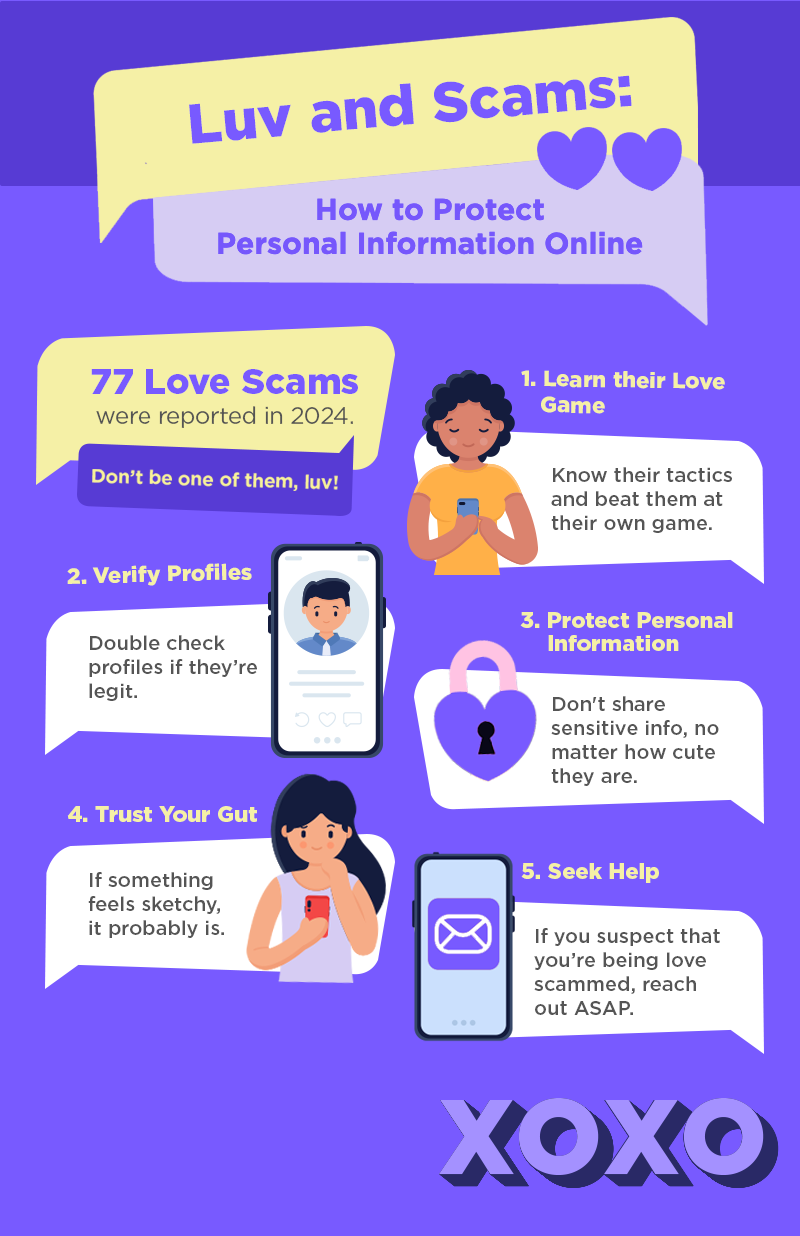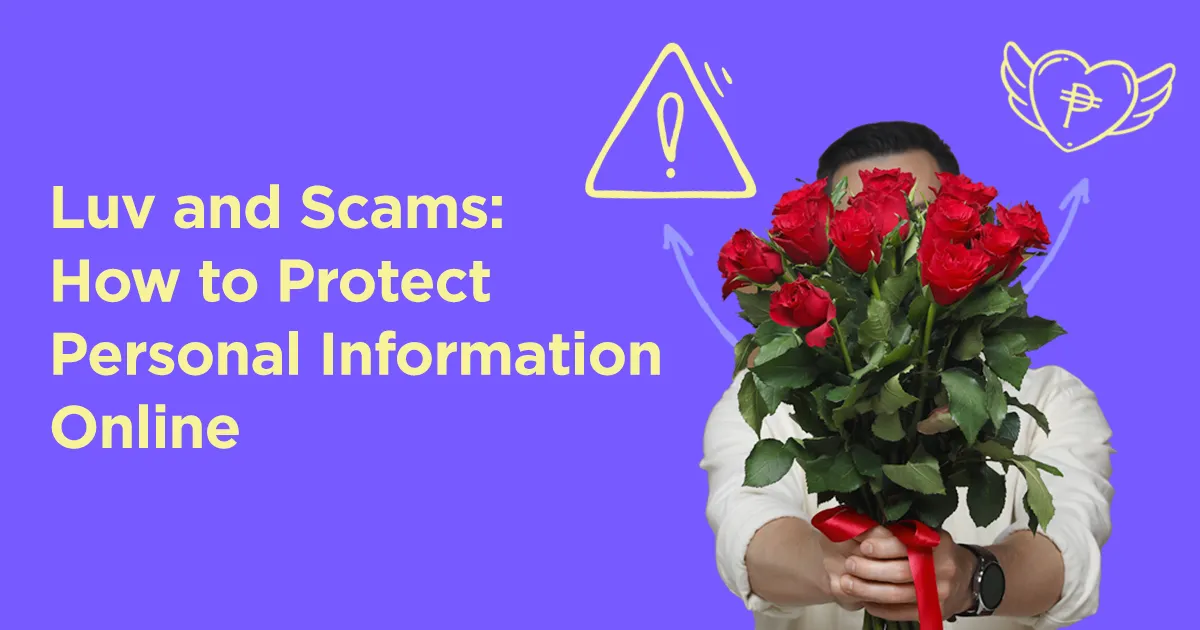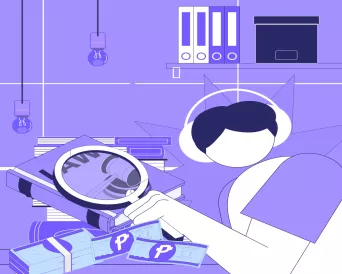Online scams are a lot like bad relationships. At the beginning, you think you’re in for something great. They promise you all these things that could change your life for the better, like: Get rich quick! Get approved for a loan instantly! I promise, she’s only a friend, you’re the love of my life!
But then you end up getting duped, and suddenly you’re on the phone with your best friend (or customer service, or both), bawling your eyes out, saying, “I thought he was the one!”
There’s no shame in that, luv. We’ve all been there. Let’s make sure that doesn’t happen again. One way to avoid getting scammed is to protect your personal information online. Don’t know where to start? Don’t worry, luv, that’s what this blog is for.
Read on and make sure you stay safe online!
Table of Contents

Understanding Personal Information Vulnerabilities
To avoid getting scammed, remember these three words: Protect Personal Information. Zip it, never say any sensitive information out loud in public, take it to your grave! In case you didn’t know which type of personal information you should keep secret, here’s the list:
- Social Security or tax identification numbers
- Credit card and bank account details
- Email addresses and login credentials
- Home addresses and contact numbers
Aside from catching you off guard, how do these filthy scammers get your personal information? They employ a bunch of strategies, including:
- Phishing Scams: Fraudulent emails or messages designed to trick you into revealing sensitive information.
- Malware and Ransomware: Malicious software that can steal or lock your data until you pay a ransom.
- Social Engineering Attacks: Manipulative tactics to trick you into revealing information.
And once they get that precious info, they’ll do all sorts of things, like:
- Make unauthorized purchases using your accounts
- Steal your identity to open fraudulent loans
- Use your personal details in phishing scams to trick others
A Note on Luv Scams
No, we’re not just talking about catfishing—though that’s definitely something to watch out for.
Financial love scams are far more insidious. In these scams, fraudsters prey on lonely individuals, manipulating them into handing over their hard-earned cash.
Their M.O.? They create fake social media profiles, reach out to potential victims, and shower them with affection. Once they've gained their target’s trust, they fabricate a crisis—a dying family member, a medical emergency, or a sudden financial hardship—and emotionally manipulate their victim into sending money.
While the PNP Anti-Cybercrime Group has reported a decrease of 51.26 percent in reported love scams (77 love scams in 2024, compared to 158 cases in 2023), these romantic fraudsters are still out there. Keep your guard up with these helpful tips:
- Learn their Love Game: They can’t dupe you if you know their tactics.
- Verify Profiles: Check if their profiles are legit. Here’s a pro-tip within a tip: If Brad Pitt is reaching out to you for hospital bills, it's probably not Brad Pitt.
- Protect Personal Information: Don't share sensitive info you just met online, no matter how cute they are.
- Trust Your Gut: If something feels sketchy, it probably is.
- Talk to Someone: Don't feel ashamed to reach out. Talk to a friend or reach out to our Customer Care Team.
How to Protect Personal Information Online
Even when you already understand personal information vulnerabilities, it can still be hard to protect personal information online. Again: Just like relationships, we tend to turn a blind eye on red flags when something (or someone) oh-so-enticing comes our way.
Don’t worry, you can follow these tips to keep you scam-proof and your personal information safe and sound:
- Secure Your Devices
- Regularly update your software and operating systems to patch vulnerabilities.
- Install a reputable antivirus program and keep it updated.
- Enable firewalls for an added layer of defense.
- Strengthen Passwords and Authentication
- Use strong, unique passwords for each account, combining letters, numbers, and symbols.
- Utilize a password manager for secure storage.
- Activate two-factor authentication (2FA) on accounts to double your security. (At Tonik, OTPs are always required for extra safety!)
- Practicing Safe Internet Habits
- Avoid using public Wi-Fi for transactions like online banking.
- Use a Virtual Private Network (VPN) to encrypt your online activity.
- Think before you click—always double-check links and emails for signs of phishing.
- Securing Social Media Accounts
- Adjust your privacy settings to control who sees your posts and information.
- Avoid oversharing personal details like your location or birthday.
- Decline friend requests or messages from strangers.
- Managing Financial Transactions Safely
- Use secure payment methods for online shopping, like virtual cards or PayPal.
- Regularly monitor your bank and credit card statements for unauthorized activity.
- Avoid saving payment details on websites or apps.
Handling Data on Third-Party Platforms
It can get even trickier trying to protect personal information with all the third-party platforms that we use on a daily basis. Here’s what you can do to keep things airtight:
- Evaluate Website Security: Check for HTTPS in the URL and ensure secure payment gateways.
- Limit App Permissions: Only allow apps access to necessary data, like location or contacts.
- Read Privacy Policies: Understand how apps or services collect and use your data before signing up.
How to Protect Personal Information from Identity Theft
Your personal information can be used for identity theft. You’ll know if you’ve been targeted if you notice unusual activity on your bank accounts (i.e. transactions you didn’t make) or get alerts for accounts that you didn’t create.
If any of these happen to you, act fast and do the following:
- Freeze your accounts immediately by contacting your bank or credit card provider.
- Report incidents to relevant authorities, like the National Privacy Commission in the Philippines.
Stay One Step Ahead
Cyber threats are constantly evolving, but staying informed can make all the difference. To protect personal information, follow cybersecurity news, revisit your security settings regularly, and rely on trusted platforms like Tonik for your financial needs.
At Tonik, your security is our priority. Whether it’s our 2-factor authentication, EMV chip technology, or 24/7 fraud monitoring, we’re here to ensure that your money—and your data—stays safe. Together, let’s build a secure and thriving digital future.
Ready to save smarter and safer? Download the Tonik App today.



